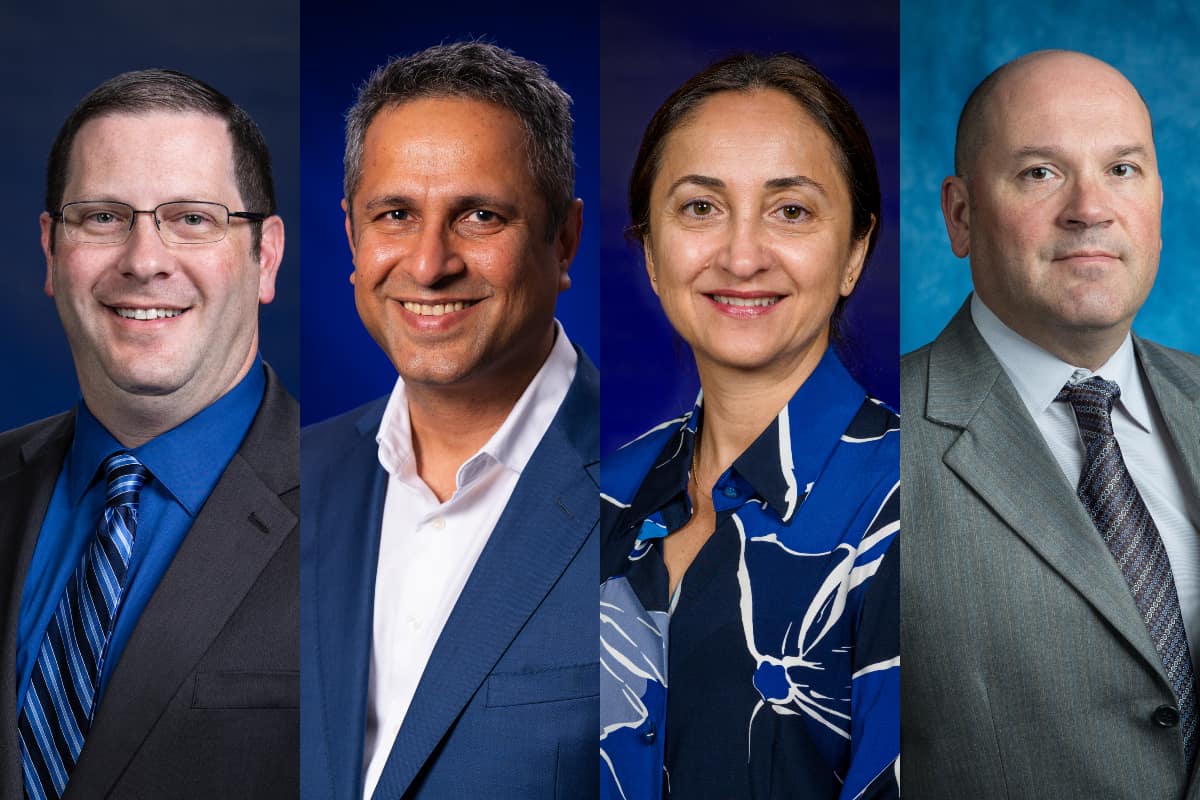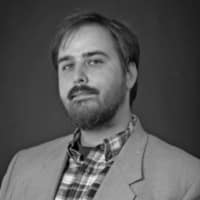Embry-Riddle Faculty Elected Fellows in the Royal Aeronautical Society

The Royal Aeronautical Society has named four Embry-Riddle Aeronautical University faculty members as fellows, the highest distinction awarded by the professional institution.
The newly appointed fellows are: Dr. Robert Thomas, associate professor of Aeronautical Science; Dr. Leila Halawi, associate professor and research coordinator of Graduate Studies; Dr. Krishna Sampigethaya, professor and chair of the Cyber Intelligence and Security Department; and Dr. Vladimir Golubev, professor of Aerospace Engineering.
The four join more than 30 faculty members from the university who have been honored by the Royal Aeronautical Society with the distinction of fellowship, which recognizes outstanding contributions to aerospace and attaining a high position within the field.
“This recognition not only honors our faculty’s individual achievements but also Embry-Riddle’s role in aerospace innovation, leadership and education,” said Embry-Riddle President P. Barry Butler, Ph.D. “Congratulations to our newest Royal Aeronautical Society fellows.”
Established in 1866, the Royal Aeronautical Society has been at the forefront of developments in aerospace, promoting the highest professional standards and providing a central forum for sharing knowledge. As the only professional body dedicated to aerospace, aviation and space communities, the Royal Aeronautical Society exists to further the advancement of aeronautical art, science and engineering around the world.
“The Royal Aeronautical Society welcomes our close collaboration with Embry-Riddle Aeronautical University, and we very much look forward to strengthening our ties alongside other leading universities dedicated to engineering excellence in aerospace,” said Jonathan C. Clare, head of External Affairs for the Royal Aeronautical Society.
Championing Innovation in Aviation Training

Dr. Thomas is an associate professor of aeronautical science at Embry-Riddle Aeronautical University’s Daytona Beach Campus. (Photo: Embry-Riddle)
An associate professor in the Aeronautical Science Department at the Daytona Beach Campus, Dr. Robert Thomas has been an innovator in aviation training and education.
“I lead by example by developing opportunities to use new tools like virtual reality,” he said, "and by encouraging students to think critically, embrace innovation and prioritize safety.”
Thomas built his expertise through hands-on aviation training and education, including time spent as a flight instructor and as a Federal Aviation Administration pilot examiner. Today, he focuses on bringing the benefits of real-world training inside the classroom.
“New technologies like virtual reality bring big opportunities, but also challenges in training and regulation,” he said.
Thanks to his efforts, aviation education is evolving to meet industry needs and advancements in technology, so that the next generation of pilots can enter the profession with the highest level of skill.
Thomas said his selection as a fellow motivates him to “keep advancing how we train future pilots and aviation professionals.”
“It’s an honor that affirms my dedication to aviation education and innovation,” he said.
Shaping Global Aerospace Education

Dr. Halawi is an associate professor and research coordinator of Graduate Studies with the Worldwide Campus’ College of Aeronautics. (Photo: Embry-Riddle)
Dr. Leila Halawi, an associate professor and research coordinator in the Department of Aeronautics at the Worldwide Campus, has earned the distinction of fellow in recognition of her 20 years of contributions to aerospace research, education and international collaborations.
Halawi’s research focuses on business intelligence and analytics, information systems, the ethical impacts of information technology and trust in artificial intelligence.
“This honor associates my work with a prestigious legacy. It’s not merely a credential, it’s an invitation to contribute to the future,” said Halawi.
Halawi is preparing students to rise to the challenges facing the aviation and aerospace industries, including automation, AI, robotics and more.
“We must view these technologies as enablers that enhance human capabilities, not merely substitutes for education, judgment or wisdom,” she said.
Known for her innovative approach to education and leadership, she received the Emerging Educator Award from SAS, a global leader in analytics software and services, for her advancement of analytics education.
“Excellence emerges through continuous learning,” said Halawi. “Innovation flourishes when curiosity drives students into unexplored territories.”
Advancing Aviation Cybersecurity

Dr. Sampigethaya is chair of the Cyber Intelligence and Security Department at the Prescott Campus. (Photo: Embry-Riddle)
Dr. Krishna Sampigethaya began his career with The Boeing Company, where he became the first associate fellow in aviation cyber-physical security. He later joined the United Technologies Corporation Research Center, where he contributed to the security of avionics and engine control systems.
Since his arrival as the department chair of the Cyber Intelligence and Security Department at Embry-Riddle’s Prescott Campus, Sampigethaya has sought to establish the university as a national leader in aviation cybersecurity through hands-on learning opportunities, research initiatives and industry partnerships.
“Innovation in aerospace now demands fluency in cybersecurity, emerging technologies such as AI and cross-disciplinary thinking,” he said. “Workforce readiness is critical. Through mentorship and global collaboration, my goal is to develop not only technical excellence but also leadership and a mindset of service in our students.”
As the aerospace sector advances in areas such as air traffic control modernization, advanced air mobility, sustainable aviation and commercial spaceflight, the rapid digitalization of systems makes cybersecurity more critical than ever. Protecting these increasingly interconnected technologies — and ensuring crew cyber readiness — are essential to maintaining the safety, resilience and trustworthiness of flight.
Dr. Sampigethaya’s election as a fellow recognizes over two decades of leadership and impactful contributions to aerospace cybersecurity. His pioneering work through education, research and collaboration has helped shape the field.
“Organizations like the Royal Aeronautical Society and Embry-Riddle play a vital role in bringing together academia, industry and government to tackle the evolving challenges of aerospace,” he said.
Leading the Way in Propulsion Research
Dr. Vladimir Golubev, a professor in the Department of Aerospace Engineering at the Daytona Beach Campus, has been recognized for his groundbreaking research in computational unsteady aerodynamics, aeroacoustics, and fluid-structure interactions.

Dr. Vladimir Golubev is a professor in the Department of Aerospace Engineering at the Daytona Beach Campus. (Photo: Embry-Riddle) Golubev, who joined the university in 2001, is the director of the Propulsion and Aerodynamics Computational Laboratory, where fellow Embry-Riddle faculty members and his students have developed innovative research into the flight of uncrewed autonomous vehicles.
For example, Golubev is currently the principal investigator on a $1.4 million NASA project aimed at reducing the noise of urban air mobility (UAM) vehicles, also known as “air taxis.”
“This is a very challenging, cutting-edge topic in aerospace engineering,” he said.
During an academic career spanning more than two decades, Golubev has received research support from numerous distinguished institutions, including the National Science Foundation, the Air Force Research Laboratory, the Air Force Office of Scientific Research, the Florida Center for Advanced Aero-Propulsion, and the United Launch Alliance.
Golubev said he takes great pride “in advising students in numerous research projects and getting them excited in reaching their research goals.”
“They bring this goal-focused attitude to their future careers,” he added.
He is also honored to be among several Aerospace Engineering faculty members who have earned the distinction of fellowship with the Royal Aeronautical Society.
“This further validates the elite standing of our Aerospace Engineering program both nationally and globally,” he said.
Editor’s note: This article has been updated to include Golubev’s recognition as a fellow.

 Keaton S. Ziem
Keaton S. Ziem